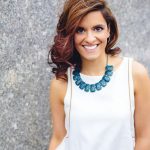
“Nadia, we should not be able to see the contours of your body. The Qur’an says cover your adornments that are most apparent. Men are dogs.”
I have performed these lines numerous times when I play the character of my Abbu, in my one-woman show, Burq Off! I embody my father according to how I remember him then, an unforgiving, strict, conservative man, with his face in a constant frown. For the purposes of my story, I depict him as the main antagonist in my life, the one I need to rebel against so that I can attain my own strength. As far as I was concerned there was a lot to rebel against.
[Read Related: Nadia Manzoor’s One-Woman Show ‘Burq Off’ Transcends Cultural Barriers with a Bikini and a Burqa]
As soon as my I started to sprout from my chest and my chin, Abbu insisted that I cover every inch of my scandalous body.
“If you parade around in miniskirts, you will get raped.”
The older I got, the more severe my father’s message became. I wasn’t supposed to show myself, not on stage, not on the dance floor in nightclubs, and certainly not in op-ed pieces about my family. That was all straight up taboo. What happened in our homes, stayed in our homes, tucked away under the lace tablecloths my mother bought in Pakistan.
There was a constant battle between Abbu and me about where the lines of Muslim modesty lay. While I felt like modesty had more to do with a woman’s opinion of herself, he assured me that it had to do with how a woman physically presented herself to the world around her.
“When you are wearing a Burqa, nobody stares. When you are in a Bikini, people cannot stop staring. You tell me which is better?!”
I started wearing bikinis and shorts with my white friends, on beaches and at parties, but always in secret. In front of Abbu, I wore baggy jeans with even baggier t-shirts, my contours fully covered.
To make sense of it all, I wrote. I didn’t expect that what I had to say would ever go further than the pink lined pages of my journal. I didn’t expect to ever have a conversation with my father about the way he raised me, and where he was coming from. I expected it all to remain private, just like he had always instructed.
The first time I ever performed Burq Off! to Abbu was at the dress rehearsal. He sat in the front row next to an older gentleman with a bald head who I didn’t recognize. I just couldn’t figure out why Abbu was so insistent on seeing the dress rehearsal.
“Abbu, it’s not ready. Come tomorrow on opening night, with everyone else.”
“No, beta. I am here. I want to be the first person to see it.”
I wondered if Abbu wanted to see this performance to prepare him self for what audiences would be seeing for days to come. To prepare himself for the potential humiliation my show would bring in our community.
When the show ended, and I practiced my bow, Abbu and his friend, began to clap. I walked up to him slowly, sweat beads trickling down my back. The 90-minute performance filled with hip-hop and Bollywood dance numbers had me drenched, but I walked right over to my Abbu, arms bared, secrets uncovered, not modest.
“What do you think?”
Without hesitation, he hugged me and said,
“Beta, I am so proud of you. I am so proud of what you have done.”
I often recount that experience when speaking to people about how my father accepted me, and showed his support for my work, in spite of our difficult history. I often recount how after every performance he would walk on to stage during the audience applause and present me with an enormous bouquet of flowers. I want people to know that my old school Pakistani Muslim father who brought me up to fear men and hide behind the duties of the traditional female is now proud of me. He is now proud of my feminist slanted storytelling.
[Read More: The Film ‘Fifty Shades of Grey’ is a Huge Leap Backwards for the Feminist Movement, And Here’s Why]
What I have never stated out loud is how proud of him I have become. How proud and honored I am to have been witness to the transformation of a man who once warned his daughter about her inherent female weakness, to a man who now celebrates his feminist daughter’s victories.
Oh Abbu, my sweet Abbu, not only have you become a beautiful expression of feminism, you have become a true inspiration for everything I do. From someone I used to be afraid of, and hide my truth from, you have become someone I now run to and someone who I call friend in a way I never thought I could.
Happy Father’s Day!
 Nadia P Manzoor is a British-Pakistani actor, writer, and producer, whose autobiographical one-woman show, Burq Off! has had sold-out runs in New York, LA, San Francisco, London and Toronto. It has been called a “Gutsy, honest, hilarious must-see!” by Deepak Chopra, and “Terrific” by The Economist. She is the co-creator and performer of Shugs & Fats, a Gotham Award winning, TriBeCa NOW featured web series that is part slapstick comedy and part cultural commentary.
Nadia P Manzoor is a British-Pakistani actor, writer, and producer, whose autobiographical one-woman show, Burq Off! has had sold-out runs in New York, LA, San Francisco, London and Toronto. It has been called a “Gutsy, honest, hilarious must-see!” by Deepak Chopra, and “Terrific” by The Economist. She is the co-creator and performer of Shugs & Fats, a Gotham Award winning, TriBeCa NOW featured web series that is part slapstick comedy and part cultural commentary.




